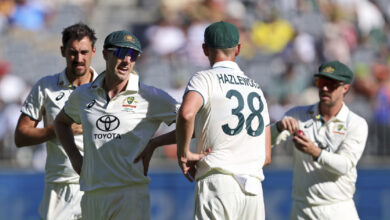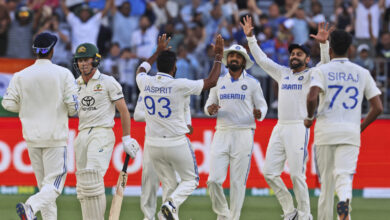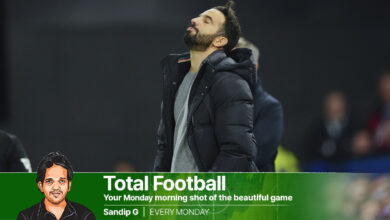Novak Djokovic: How the wars shaped tennis’s all-conquering warrior | Tennis News

Even in his finest hour, Novak Djokovic likes to revisit his darkest days. After his 24th Grand Slam, in the courtside interview, he spoke about the trauma of growing up in 90s’ Belgrade. There’s a night from that violent decade of wars, sanctions, rationing and brutal NATO bombing that the Serb keeps going back to. Djokovic once said that he, his two brothers and wife – all children of war and strife – often talk about how the watershed moment of their collective temerity shaped their lives.
It was in 1999, a pre-teen Djokovic, along with friends, family and thousands others, stood on the city’s main bridge with target signs painted on their heads and songs on their lips. Having lost the patience of being in bomb-shelters for months, they were challenging hollowing F-117s to take them down along with the city’s iconic landmark.
The Washington Post would call that unique Serbian reaction to the unending sporadic air strikes as a “mixture of fatalism, defiance, gallows humor and paranoia.” Years later reporters would use many of those words, or those similar to them, to describe the one-of-a-kind greatest ever tennis player.
Fatalism would be replaced philosophical, defiance got changed to doggedness and his half smile after those laconic Balkan one-liners would continue to draw laughs. Paranoia too would get a positive spin, it would get dressed as a perfection’s in-built suspicion about any new young challenger with the faintest of intentions of questioning his authority.
Scared, scarred
Facts agree with this parallel. No one born in the 90s has won a Grand Slam that had Djokovic in the draw and now the Y2K Generation too is finding it tough to climb Mt Djoko. Those past 25 years , they—Daniil Medvedev, Alexander Zverev, Stefanos Tsitsipas, Casper Ruud and Dominic Thiem—have been scarred for life; they are unlikely to beat Master till he finally calls it a day. The 20-somethings – Carlos Alcaraz and Ben Shelton – too must be cursing their luck for being born in the unending Djokovic era.
Helping him deflate these kiddy soap bubbles of hope for close to a decade are those who were on the bridge with him and coaches from his part of the world – Croat Goran Ivanisevic and Slovak Marian Vajda. There’s also his charming children – the little girl with pig tails and the boy with angelic face.
Serbia’s Novak Djokovic celebrates with his daughter Tara Djokovic after winning his final match against Russia’s Daniil Medvedev. (Reuters)
Djokovic, after defeating Medvedev in the US Open final, got emotional when mentioning his six-year-old daughter Tara. Wife Jelena had ensured the ba of the family got the front seat and was placed straight in the eye line of her father when he sat on the bench between games. In the second set, with Medvedev playing out of his skin and Djokovic running on fumes after long rallies, the seating arrangement worked. It was the longest set the champion had ever played and he seemed to be losing his drip. It was at that tense moment, Tara gave her father what no one could.
“She was facing me. When I saw her, she smiled at me. It was innocent child energy I got from her. When I was going through those tough moments in the second set and I needed a bit of push and energy, she gave me that ‘lightness’,” he said. That priceless, infectious “lightness” would take Djokovic’s mind away from the complicated consequences of the tennis, unburden him from the weight of hory and beat the opponent who forces his rivals to hit that extra shot to win a rally.
The 90s Post piece, exploring the psyche of the city under siege, mentions a unique Serbian trait called Inat. Difficult to translate, it is a combination of stubbornness, defiance and cheekiness. The ground report explains with an example: “A waiter spitting in the soup of a patron who has been rude”. It also chronicles Belgrade’s gall of coming up with bunker jokes even when death was just a sortie away. Q: What’s the difference between a red or black beetle? A: They taste different. Djokovic is a true Serb, he has Inat.
Novak Djokovic, center, is seen on a big screen as he makes a surprise appearance on the balcony of Belgrade’s city hall during a celebration. (AP)
Jelena, meanwhile, brings the “heaviness” that is mandatory for the “no stone left unturned” pur. She got him into yoga, got a reiki master in the team and forced him to open up about his inner feelings and insecurities. It’s a holic approach to tennis that keeps him a step ahead of the many prince-in-waiting and not-quite-apparent heirs.
Infamous for double faults at crucial stages, Zverev lacks in temperament. Tsitsipas is prone to injuries. Thiem lacked ambition, his own confession he “fell into a hole” after winning the US Open. Then there’s Casper Ruud, from the idyllic Norwegian sporting system where kids at sprawling modern stadiums are asked to enjoy themselves and not worry about winning. Poor Casper, what are the chances he gets the better of a Serbian kid who didn’t give up the game even when his city was bombed? When your father keeps funding your tennis even when the family of five had to manage a meal for just 10 dollars, winning is not an option. It’s a compulsion.
Calm and cranky
So when Djokovic lost to Alcaraz at Wimbledon, old timers vouched Team Djokovic would have gone to the mattresses. At the US Open, coach Ivanisevic was asked to describe the first training session after the loss that the uninitiated saw as the “passing of baton”. “Was he cranky?” the reporter would ask. The answer had that good old Ivanisevic drawl: “At training, he is always cranky”. To be calm on court, he needs to be cranky when training.
Carlos Alcaraz with Serbia’s Novak Djokovic after winning the final REUTERS
When you are relentlessly pursued younger legs, there is no time to rest. Djokovic says that at 36, you need to reinvent your game every month or every week. The expected would unfold. Within months of the epic loss to the 20-year-old Spaniard, Djokovic defeated Alcaraz at Cincinnati Masters. He would tear his shirt, roar like a lion reclaiming his status as the king of the jungle.Most Read
1
Deepika Padukone says she did Jawan only for Shah Rukh Khan, King Khan says ‘we fooled Deepika’
2
‘Selling a false dream’: Indian students abroad open up about mental health issues
See More
At this US Open, Djokovic would face another rookie in the semi-final. The Americans had hyped local boy Shelton like only they can. The towering 20-year-old had fired a 147-mph serve that is still the year’s fastest. Beach boy looks, kitchen-sink tactics, charmingly left-handed, the erstwhile tennis superpower thought they had found their own Alcaraz. The match was over in straight sets, the hype ended much before.
After the game, Shelton made an audacious statement. He said Djokovic had a similar mentality like him. Not the other way round. Even on the court, he was far from being chivalrous to the champ. The Serb didn’t indulge in verbals, though after the win he did pantomime slamming an imaginary phone receiver and gave a cold handshake at the net.
The reaction seemed a lesson from a story that Djokovic loves narrating. One day a snake got into a carpenter’s shop. Confusing the saw for a predator with sharp teeth, the snake wrapped itself around it. It tried to suffocate the saw, only to die within minutes. Djokovic is no silly snake, he is a spiritual superman with a sense of humour.
Send your feedback to sandydwivedi@gmail.com






